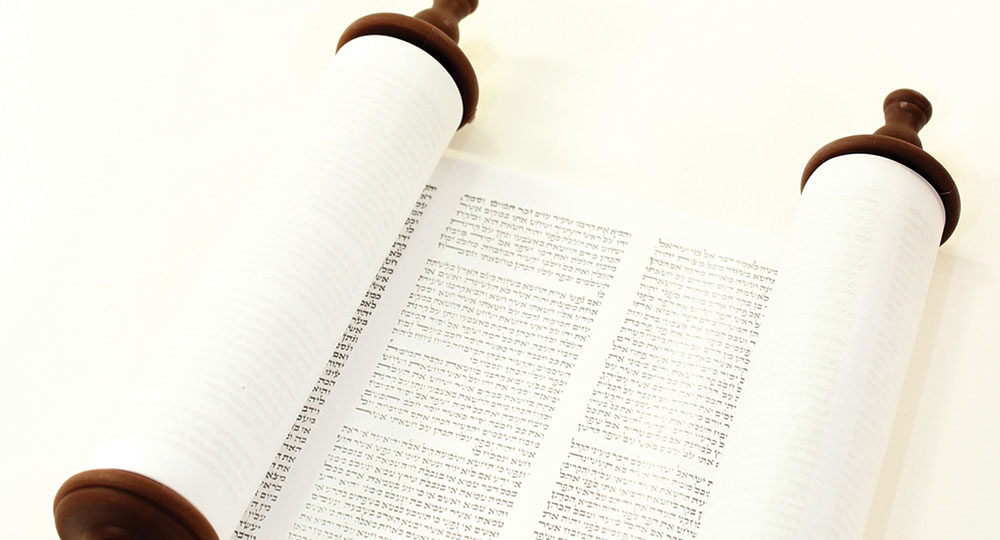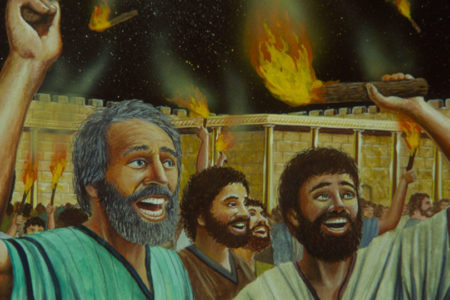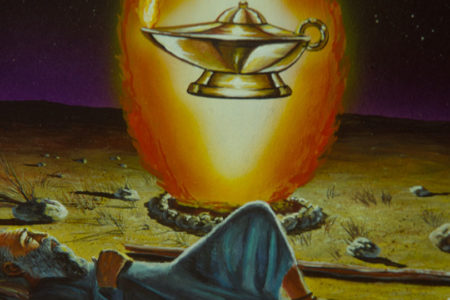Simchat Torah: Celebrating the Bible
All the world is dancing, singing,
On this joyous holiday.
Hearts are merry, voices ringing.
See how the Torah leads the way.
On! On! March along!
All our voices join in song.
Hear the melody, lively, gay;
This is Simchat Torah day.1
One of the happiest of all Jewish holidays is Simchat Torah (Rejoicing over the Law). Second only to Purim in hilarity, this delightful holiday has but one word to describe it—joy. There is joy in the home. There is joy in the synagogue. There is joy throughout the entire Jewish community.
Origin and Description of Simchat Torah
Characterized by singing, hand clapping, and dancing, Simchat Torah marks the annual completion of the public reading of the five books of Moses. It was not observed as a separate holiday until the ninth or tenth century. Although the holiday itself is not biblical, the act of public Bible reading is (see Dt. 31:10–13; Josh. 8:34–35; 2 Chr. 34:30; Neh. 8:3, 8, 18; 9:3; 13:1).
By New Testament times, the custom of reading the Law of Moses every Sabbath was practiced widely (Acts 13:15; 15:21; 2 Cor. 3:14–15).2 Later, the Torah was read not only on the Sabbath but on Mondays and Thursdays as well.3
At first, reading through the five books of Moses was completed in three years.4 Eventually, however, the readings were made longer so they could be completed within a one-year cycle.
Observance of Simchat Torah/span>
Observed on the 23rd day of the Jewish month Tishri (September-October), Simchat Torah immediately follows the Feast of Tabernacles. In Israel, however, the holiday is observed on the eighth day of Tabernacles (Lev. 23:36), called Sh’mini Atzeret.
During the evening service in the synagogue, all the Torah scrolls are gleefully carried around seven times. This procession is known as hakafot. Unique to the evening service of this holiday is the reading of a portion from the Torah. On no other occasion during the year is the Torah read at night.
At the service the following morning, the same procedure takes place. After the hakafot, three scrolls are used for the holiday’s Torah readings. The last reader of the first scroll receives the highly respected title of Bridegroom of the Torah. It is his privilege to conclude the year’s Torah reading cycle by reading Deuteronomy 33:27–34:12.
Simchat Torah designates not only the completion of one Torah cycle but also the beginning of another, for on this day the reading of the second Torah scroll introduces the new cycle for the coming year. The reading is from Genesis 1:1–2:3, and the honored reader is called Bridegroom of the Beginning.
The final reader at the Simchat Torah service reads from the third scroll Numbers 29:35–40. He also reads the day’s portion from the prophets, namely the first chapter of Joshua.5
The day is drawn to a close with the Bridegroom of the Torah providing a sumptuous feast for the entire congregation. With the conclusion of Simchat Torah, the Jewish calendar is empty of holidays until the winter festival of Hanukkah.
Simchat Torah and Prophecy
With its post-biblical origin, Simchat Torah does not hold any prophetic implications.
The practice of public Torah reading also does not play into future events. The events of the thousand-year earthly reign of Messiah Jesus, however, might bear some resemblance to public Torah reading: “And many people shall go and say, Come ye, and let us go up to the mountain of the LORD, to the house of the God of Jacob; and he will teach us of his ways, and we will walk in his paths; for out of Zion shall go forth the law [Torah], and the word of the LORD from Jerusalem” (Isa. 2:3).
Lessons from Simchat Torah
Although the holiday itself was not instituted by God, valuable spiritual lessons can still be learned from Simchat Torah.
- Our hearts should rejoice over God’s written Word. “I rejoice at thy word, as one that findeth great spoil” (Ps. 119:162).
Corrie ten Boom must have felt much like the psalmist. During World War II she was locked away in a Nazi prison camp because she and her family had hidden Jews in their home. Upon receiving a portion of the New Testament from a friendly nurse, Miss ten Boom clutched it in her hands, praising God, knowing that she had in her possession the greatest treasure one could ever find.6
In like manner, out of sheer joy for having such a prize, when was the last time we clutched our Bibles to our hearts? How long has it been since euphoria characterized our lives because we knew we had in our hands the very Word of God?
King David penned the words, “The statutes of the Lᴏʀᴅ are right, rejoicing the heart” (Ps. 19:8). If we have no joy over the Word of God, perhaps it is because we are not reading it. Or perhaps we choose to read only portions of it, instead of reading it in its entirety. Perhaps still, the frequency of our Bible reading is like the Saturday-Monday-Thursday pattern in the synagogue. We read God’s Word only when it is convenient for us and do not make an attempt to read it every day (cp. Josh. 1:8). When we approach the Bible in this buffet-style way, we should not be surprised if we do not find our hearts singing with joy, as the Scriptures say they should.
Our response to God’s Word should be like that of the Prophet Jeremiah: “Thy words were found, and I did eat them, and thy word was unto me the joy and rejoicing of mine heart; for I am called by thy name, O Lᴏʀᴅ God of hosts” (Jer. 15:16).
- Our hearts should rejoice over God’s incarnate Word. Jesus of Nazareth, the Messiah, was the ultimate expression of God’s Word to mankind (Heb. 1:1–2a). In Him, the Word of God literally became flesh (Jn. 1:1, 14). For this, and for what He accomplished through His atoning death and victorious resurrection, we certainly have great cause for rejoicing (Phil. 4.4).
Unfortunately, there are many who cannot rejoice because they do not know the Lord. They can only rejoice over God’s written Word. They are blinded to God’s incarnate Word, “for until this day remaineth the same veil untaken away in the reading of the old testament; which veil is done away in Christ. But even unto this day, when Moses is read, the veil is upon their heart” (2 Cor. 3:14–15).
Even though Jewish people read the Torah and rejoice in it, the veil that Moses wore (v. 13) is not lifted from their hearts, because the “veil is done away in Christ” (2 Cor. 3:14). If only they would heed a verse of Scripture that is part of the liturgy on Simchat Torah: “And it shall be said in that day, Lo, this is our God; we have waited for him, and he will save us: this is the Lᴏʀᴅ; we have waited for him, we will be glad and rejoice in his salvation” (Isa. 25:9).
As the Jewish heart can choose to rejoice over the written Word of God on Simchat Torah, it can also choose to rejoice over the Word that became flesh, for “when it shall turn to the Lord, the veil shall be taken away” (2 Cor. 3:16). The same can be said of the heart of the Gentile. The Word became flesh not only for the Jew, but also for the non-Jew (Rom. 15:8–10).
Being convinced of this truth, it is incumbent upon the redeemed, both Jew and Gentile, to rejoice over the incarnate Word of God, “Whom, having not seen, ye love; in whom, though now ye see him not, yet believing ye rejoice with joy unspeakable and full of glory” (1 Pet. 1:8).
Therefore, brothers and sisters, let us “Rejoice evermore” (1 Th. 5:16).
ENDNOTE
- “Yom Tov Lanu” from Harry Coopersmith, comp. and ed., The New Jewish Song Book (New York, NY: Behrman House, Inc., 1965), 15-16.
- The first-century Jewish historian, Josephus, confirmed this weekly reading of the Pentateuch. He related that the Jewish people would “assemble together for the hearing of the law, and learning it exactly, and this not once or twice, or oftener, but every week,” William Whiston, trans., Josephus (Grand Rapids, MI: Kregel Publications, 1960), Against Apion 2.18.
- By AD 200 at the latest, when the Jewish Oral Law was completed in its written form, the Saturday-Monday-Thursday Torah reading pattern had been established. See The Mishna, trans. Herbert Danby (New York, NY: Oxford University Press, 1933), Megillah 3.6.
- “Yes, for the people of Palestine, who complete the reading of the Pentateuch in three years,” The Babylonian Talmud, trans. Under the editorship of Rabbi Dr. I Epstein et al, 18 vols (London: The Soncino Press, 1938), Megillah 29b. The triennial cycle was the custom during the time of Jesus and the apostles.
- The Talmud indicates that the original Haftarah was taken from 1 Kings 8:22 and following, Babylonian Talmud Megillah 31a. It is likely that Joshua 1 became the new Haftarah during the ninth century, The Jewish Encyclopedia, 12 vols., (New York, NY: Funk and Wagnalls Company, 1905-12), vol. 11, 365.
- Corrie ten Boom, with John and Elizabeth Sherrill, The Hiding Place (Washington Depot, CT: Chosen Books, 1971), 136.








